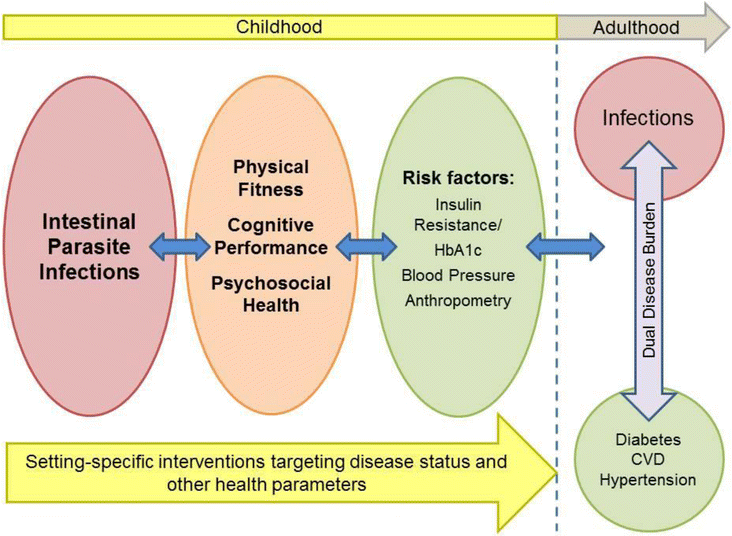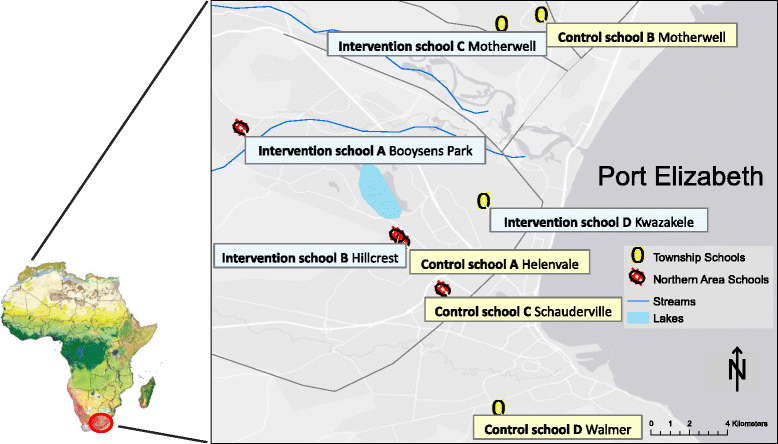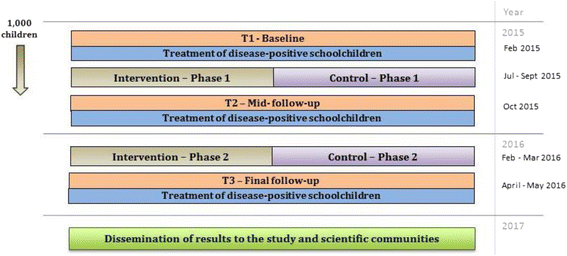Disease, activity and schoolchildren's health (DASH) in Port Elizabeth, South Africa: a study protocol
- PMID: 26700478
- PMCID: PMC4690231
- DOI: 10.1186/s12889-015-2636-y
Disease, activity and schoolchildren's health (DASH) in Port Elizabeth, South Africa: a study protocol
Abstract
Background: An in-depth epidemiological investigation on intestinal parasite infections in an impoverished area of Port Elizabeth, South Africa provides a unique opportunity for research on its impact on children's physical fitness, cognitive performance and psychosocial health. Additionally, we will screen risk factors for the development of diabetes and hypertension in adulthood.
Methods/design: A 2-year longitudinal cohort study will be conducted, consisting of three cross-sectional surveys (baseline and two follow-ups), in eight historically black and coloured (mixed race) primary schools located in different townships in Port Elizabeth, South Africa. Approximately 1000 Grade 4 primary schoolchildren, aged 8 to 12 years, will be enrolled and followed. At each survey, disease status, anthropometry and levels of physical fitness, cognitive performance and psychosocial health will be assessed. After each survey, individuals diagnosed with parasitic worm infections will be treated with anthelminthic drugs, while children with other infections will be referred to local clinics. Based on baseline results, interventions will be tailored to the local settings, embedded within the study and implemented in half of the schools, while the remaining schools will serve as controls. Implementation of the interventions will take place over two 8-week periods. The effect of interventions will be determined with predefined health parameters.
Discussion: This study will shed new light on the health burden incurred by children in deprived urban settings of South Africa and provide guidance for specific health interventions. Challenges foreseen in the conduct of this study include: (i) difficulty in obtaining written informed consent from parents/guardians; (ii) administration of questionnaires in schools where three languages are spoken (Afrikaans, Xhosa and English); (iii) challenges in grasping concepts of psychosocial health among schoolchildren using a questionnaire; and (iv) loss to follow-up due to the study setting where illiteracy, mobility and violence are common. Finally, designing the health interventions together with local principals and teachers will allow all concerned with the research to bolster a sense of community ownership and sustained use of the interventions after the study has ceased.
Trial registration: Controlled-trials.com; identifier: ISRCTN68411960 (date assigned: 14 February 2014).
Figures
References
-
- United Nations Department of Economic and Social Affairs . Open working group proposal for sustainable development goals. 2014.
-
- Walter CM. In-school physical activity patterns of primary school learners from disadvantaged schools in South Africa. Afr J Phys Health Educ Recr Dance. 2011;17:780–9.
Publication types
MeSH terms
Substances
Associated data
LinkOut - more resources
Full Text Sources
Other Literature Sources
Medical





